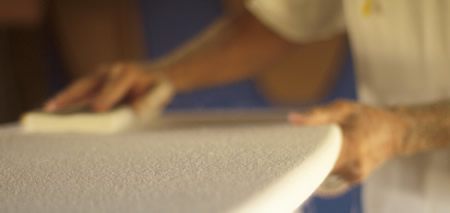The role of craft designer…
I read an excellent paper titled ‘The Role of Craft Designer Towards Sustainable Production and Consumption’. It had one of the clearest definitions of “Sustainable Production” that I’ve come across to date – “Sustainable production and consumption is ‘the use of goods and services that respond to basic needs and bring a better quality of life, while minimizing the use of natural resources, toxic materials and emissions of waste and pollutants over the life cycle, so as not to jeopardize the needs of future generations’ “.
It was easy to draw parallels between the German shoe industry it discussed and the hand-made surfboard industry.
Here’s a fitting quote that links the 2 industries together –
“How do craft designer-makers create meaningful user-product relationships? The answer is in part that craft designer-makers have always striven to maximise user-product relationships. This is especially so in the case of a commissioned piece of work where user-centered design (in this context it means talking to your client) is an integral part of the design process.”
Does that ring a bell? If you’ve ever ordered a custom board from a shaper that meaningful interaction of talking through your next board makes for a truly individual and unique experience. Luckily, the China-board fiasco has died down a bit mostly due to a shitty economy and the suppliers own greed and overproduction. Some shapers were smart enough to focus on their expertise and knowledge and deliver that as part of the buying process and not just offer up their boards as a commodity trying to compete against the lowest bidder. That’s where the true value comes into the equation. You’re not just buying the end result. You are paying for the knowledge and experience of the shaper that has gone into that board.

The mention of commissioned pieces reminds me of similar problems the custom furniture industry has – part of the reason we featured Jeff Martin a while back. It’s the same style of craftsmanship and attention to detail that is such a scarce resource in this day and age of product commoditization. We’re losing valuable resources in the form of experienced craftsman because we are losing the battle to mass merchandising.
The “eco” bandwagon is in full effect, to the point where it’s lost it’s meaning and is an ineffective qualifier for most products out there. The surf industry is especially guilty of this rampant overuse. There is so much “noise” out there about eco-this and eco-that, it drowns out the handful of companies that base their core business principles on sustainable production, not just a limited fall run of “eco-basics”. If you start looking at actual surfboards and not just the surfing industry (read: clothing), the companies truly putting an effort into sustainable manufacturing can be counted on one hand.
To steal another quote from the paper -“The idea, to keep users and their products together for longer, is of course an anathema to many manufacturers of mass-produced products who strive to encourage their customers to get rid of their ‘old’ product and replace it with the latest ‘new’ innovation.”
The paper closes off with this summarization – “Craft all too often sits in a cultural niche. Craft has to extend beyond its normal niche, become more fluid, it has to reclaim its utilitarian purpose while embedding its aesthetic sensibilities if it is to work with the manufacturing industries to address sustainable production and consumption issues.”
“Without art, craft and design, sustainability fails.”
I’ve done poor job of summarizing the paper, but I saved it to a Google Doc. Please take the time to read it by clicking the link below if you have any interest at all in sustainability –
Towards sustainable production and consumption – the role of craft designer-makers
by Alastair Fuad-Luke
experienced craftsmen = valuable resource.
I like the sound of that!